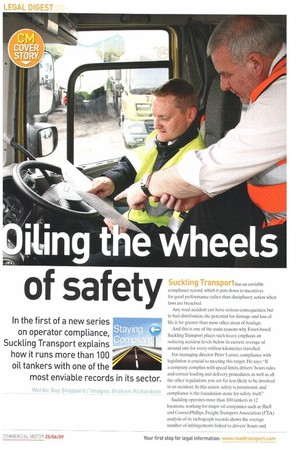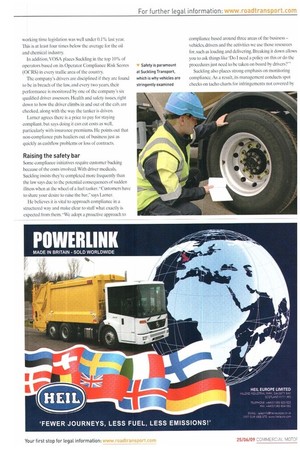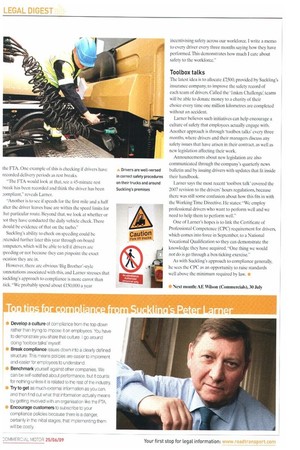of safety
Page 24

Page 25

Page 26

If you've noticed an error in this article please click here to report it so we can fix it.
In the first of a new series on operator compliance, Suckling Transport explains how it runs more than 100 oil, tankers with one of the most enviable records in its sector.
Words: Guy Sheppard / Images: Graham Richardson Suckling Transport has an enviable compliance record, which it puts down to incentives for good performance rather than disciplinary action when laws are breached.
Any road accident can have serious consequences, but in fuel distribution, the potential for damage and loss of life is far greater than most other areas of haulage.
And this is one of the main reasons why Essex-based Suckling Transport places such heavy emphasis on reducing accident levels below its current average of around one for every million kilometres travelled.
For managing director Peter Lamer, compliance with legislation is crucial to meeting this target. He says: "If a company complies with speed limits, drivers' hours rules and correct loading and delivery procedures, as well as all the other regulations, you are far less likely to be involved in an accident. In this sector, safety is paramount, and compliance is the foundation stone for safety itself."
Suckling operates more than 100 tankers in 12 locations, working for major oil companies such as Shell and ConocoPhillips. Freight Transport Association (ETA) analysis of its tachograph records shows the average number of infringements linked to drivers' hours and
working time legislation was well under 0.1% last year. This is at least four times below the average for the oil and chemical industry.
In addition, VOSA places Suckling in the top 10% of operators based on its Operator Compliance Risk Scores (OCRS) in every traffic area of the country.
The company's drivers are disciplined if they are found to be in breach of the law, and every two years, their performance is monitored by one of the company's six qualified driver assessors. Health and safety issues, right down to how the driver climbs in and out of the cab, are checked, along with the way the tanker is driven.
Lamer agrees there is a price to pay for staying compliant, but says doing it can cut costs as well, particularly with insurance premiums. He points out that non-compliance puts hauliers out of business just as quickly as cashflow problems or loss of contracts.
Raising the safety bar Some compliance initiatives require customer backing because of the costs involved. With driver medicals. Suckling insists they're completed more frequently than the law says due to the potential consequences of sudden illness when at the wheel of a fuel tanker. "Customers have to share your desire to raise the bar," says Lamer.
He believes it is vital to approach compliance in a structured way and make clear to staff what exactly is expected from them. "We adopt a proactive approach to compliance based around three areas of the business — vehicles, drivers and the activities we use those resources for, such as loading and delivering. Breaking it down allows you to ask things like 'Do I need a policy on this or do the procedures just need to be taken on board by drivers?"
Suckling also places strong emphasis on monitoring compliance. As a result, its management conducts spot checks on tacho charts for infringements not covered by the PTA. One example of this is checking if drivers have recorded delivery periods as rest breaks.
"The PTA would look at that, see a 45-minute rest break has been recorded and think the driver has been :ompliant." reveals Lamer.
-Another is to see if speeds for the first mile and a half Eifter the driver leaves base are within the speed limits for :hat particular route. Beyond that, we look at whether or tot they have conducted the daily vehicle check. There ;hould be evidence of that on the tacho.
Suckling's ability to check on speeding could be -.:xtended further later this year through on-board :omputers, which will be able to tell if drivers are ;peeding or not because they can pinpoint the exact ()cation they are in.
However, there arc obvious 'Big Brother'-style :onnotations associated with this, and Lamer stresses that iuckling's approach to compliance is more carrot than tick. "We probably spend about £150.000 a year incentivising safety across our workforce. I write a memo to every driver every three months saying how they have performed. This demonstrates how much I care about safety to the workforce."
Toolbox talks
The latest idea is to allocate £7.500, provided by Suckling's insurance company, to improve the safety record of each team of drivers. Called the `linkm Challenge', teams will be able to donate money to a charity of their choice every time one million kilometres are completed without an accident.
Lamer believes such initiatives can help encourage a culture of safety that employees actually engage with. Another approach is through 'toolbox talks' every three months, where drivers and their managers discuss any safety issues that have arisen in their contract, as well as new legislation affecting their work.
Announcements about new legislation are also communicated through the company's quarterly news bulletin and by issuing drivers with updates that fit inside their handbook.
Lamer says the most recent 'toolbox talk' covered the 2007 revision to the drivers' hours regulations, because there was still some confusion about how this fits in with the Working Time Directive. He states: "We employ professional drivers who want to perform well and we need to help them to perform well."
One of Lamer's hopes is to link the Certificate of Professional Competence (CPC) requirement for drivers, which comes into force in September, to a National Vocational Qualification so they can demonstrate the knowledge they have acquired. -One thing we would not do is go through a box-ticking exercise."
As with Suckling's approach to compliance generally, he sees the CPC as an opportunity to raise standards well above the minimum required by law. •












































































































































